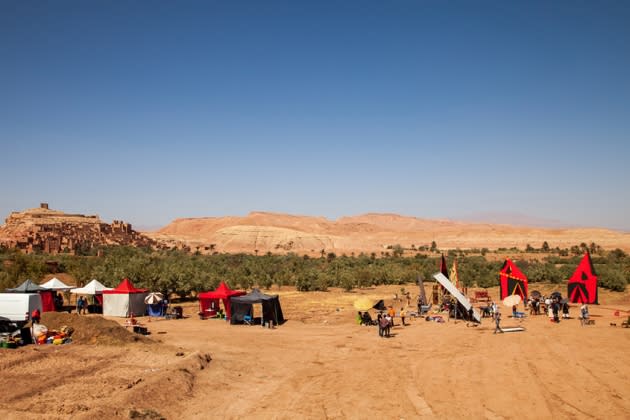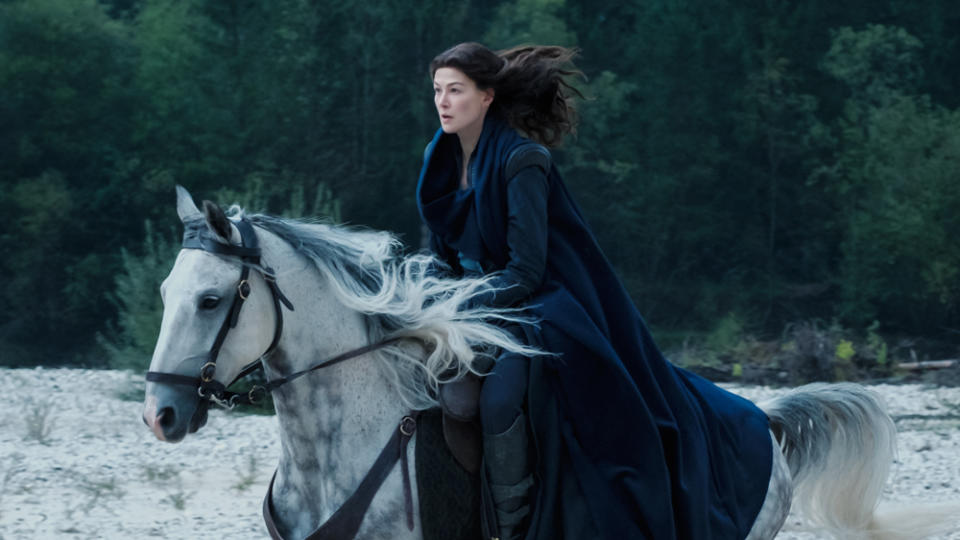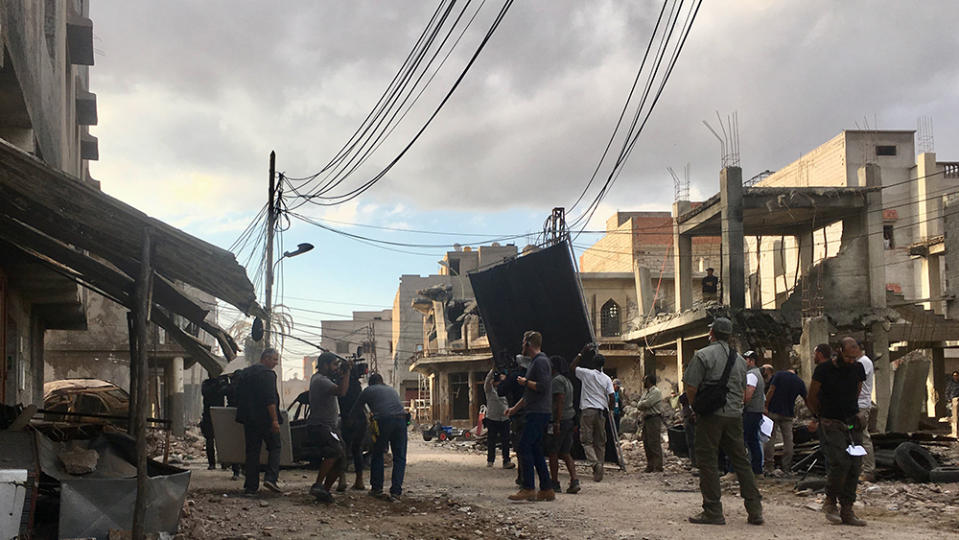Khadija Alami Plans Major Studio Near Marrakech as Uncapped Rebate Revs Up Foreign Shoot Scene (EXCLUSIVE)

Morocco has been attracting a rising number of high-profile foreign shoots since March 2022, lured by the country’s locations, skilled crews, competitive rates and its revamped cash rebate scheme, which has been hiked from 20% to 30% of eligible spend.
Of crucial importance the ceiling on the rebate available for each film has now been scrapped – offering a major boost to lengthy, large-scale productions.
More from Variety
'Deserts,' from 'Death for Sale' Helmer Faouzi Bensaïdi, Leads Morocco's Presence at Atlas Workshops
102 Distribution Boards Jordanian Indie Music Doc 'Independent Scene' (EXCLUSIVE)
Previously the maximum rebate per film was capped at $1.8 million. The total amount available per year for all projects is $10 million, granted on a first-come/first-served basis.
Other benefits available to foreign shoots include exemption from sales tax and zero fringe payments for crews.
To qualify for the rebate, productions must have a minimum Moroccan production spend of $1 million, an 18-day Moroccan shoot, at least a 25% local crew, and a local line producer.
Morocco’s previous 20% scheme was introduced in 2016 and fueled a progressive rise in foreign production visits, until strict COVID-19 lockdowns were introduced in 2020, including closure of the national borders to foreign visitors.
The situation only began to fully normalize in late 2021, but as the borders opened foreign shoots have returned in force.
The country’s main line producers include Agora, K Films, Moroccan Productions & Services (Mps), Dunes Films, Kasbah Films, Zak Productions, H Films, Bo Film Services, Lions Production & Service and Mont Fleuri Production.
Zak Productions
Zakaria Alaoui, CEO of Zak Productions, has been line producing foreign shoots since 1995.
Following the lifting of lockdown restrictions in late 2021, Lucasfilm’s “Indiana Jones 5” began lensing, with a 100-man crew and a 3-week shoot in the historic city of Fez.
To enable location scouting during the lockdown, the Moroccan government facilitated permits, enabling a 40-strong team to travel to Fez for a tech scout.
The shoot had already been stalled on various occasions before lensing in Morocco, due to COVID restrictions and after Harrison Ford suffered a severe shoulder injury during the U.K. shoot, in June 2021.
In mid-2022, Zak Films handled a two-week shoot for the last episode of Season 3 of Netflix’s fantasy series, “The Witcher,” which lensed in the Moroccan desert, near Erfoud, for scenes starring Freya Allan (Ciri).
Alaoui has just produced a six-week Moroccan shoot for Disney India’s “The Freelancer,”, which shot in Tangier, Marrakech and Ouarzazate and is now continuing its shoot in India.
Other recent projects include a two-day shoot in Marrakech for Legendary’s “Godzilla vs Kong 2” and another shoot for Legendary on Jeymes Samuel’s biblical tale, “The Book of Clarence,” which was partially filmed in Morocco.
Prior to the pandemic, Zak Films produced several shows in 2019, including “The 355,” that filmed in Marrakech, Marvel Studios/Disney’s “Black Widow” that lensed in Tangier, and Netflix’s “Inventing Anna,” that shot in Marrakech’s iconic La Mamounia hotel, home to top festival guests.
He was also involved in an eight-month prep for the independent production “The Alchemist” which suffered repeated postponements due to the pandemic.
Alaoui sees major upside in the wake of the revamped 30% uncapped cash rebate scheme: “This is a game-changer for us. Now we have all the tools to compete with other countries. It was one of the first measures introduced by Mohamed Mehdi Bensaid, our new Minister of Culture and Communication who really understands how the film business works.”
He nonetheless identifies several bottlenecks, including major price hikes in studio and hotel costs in Ouarzazate, which is a key location for foreign shoots.

K Films
Khadija Alami’s K Films is prepping a two-week Moroccan shoot on TV series “The Lioness,” starring Zoe Saldana.
During the lockdown, special permits issued by the government enabled a handful of foreign shoots to occur in production bubbles. For example, Alami line-produced a two-week shoot in 2020 in Marrakech for Apple’s “Invasion.”
In 2021, she handled the desert shoot for the British mini-series, “SAS Rogue Heroes,” that lensed in Erfoud, El Jadida and Essaouira.
Alami is currently developing the project “Bilqiss” in co-production with Kennedy/Marshall, based on the book by the French Moroccan writer, Saphia Azzedine, to be directed by Oualid Mouaness.
She is also working with another U.S. company, Danny Glover and producer Joslyn Barnes’ Louverture, on the second feature film from Moroccan-British helmer Tala Hadid, whose “Narrow Frame of Midnight” Alami produced in 2013.
She is also developing a Moroccan TV series and is looking for an international co-producer.
Alami has her own studio facility, Oasis Studios, in the desert-located Ouarzazate, and is the president of the Ouarzazate Film Commission.
Alami is also the president of the Mediatalents Association based in Ouarzazate, which organizes four writing labs a year.
Having developed Oasis Studios in 2016, she is now prepping a more ambitious project – to build a major studio facility near Marrakech.
“Morocco needs large-scale sound stages,” she says. “At present big budget foreign productions typically lens their exterior scenes in Morocco and then shoot interiors in sound stages such as Pinewood or Shepperton. With the newly revised 30% uncapped cash rebate scheme we can attract much bigger projects.”
Working with four partners, she is planning a brand new studio facility near Marrakech, with four sound stages, the first of which she hopes will open in late 2023.
Negotiations are underway with Moroccan authorities to build an extensive eco-system around the studios that will also include film schools and technology schools.
The project also plans to include virtual production facilities and will be targeted not only at film and TV but also videogame production.
Alami says that the four stages will be a 4,000 square-meter (sq. feet) stage (Pinewood’s 007 stage is 5,000 square-meters big), complemented by 3,000 sq.-meter, 2,000 m2 and 1,000 m2 stages.
“When I talk about a project I believe in it and will do everything I can to make it happen”, she says.
Kasbah Films
Kasbah Films, jointly managed by Karim Debbagh and Michael Dreher, line-produced the TV series, “Wheel of Time” which was the second major project lensed after the end of the pandemic, and was shot in CLA and Atlas Studios, Ouarzazate, between February to May, 2022.
This was followed by the Moroccan segment of Netflix’s romance pic, “Lonely Planet,” starring Laura Dern and Liam Hemsworth, which is now in post.
They handled the two-week Moroccan shoot for Apple’s sci-fi thriller “Constellation,” starring starring Noomi Rapace and Jonathan Banks and directed by Michelle MacLaren (“Breaking Bad”). It lensed primarily in Marrakech and in Erfoud in the desert.
Kasbah Films’ major projects just before the pandemic included Terence Malick’s “The Way of the Wind,” “Men in Black” and the Russo Brothers’ “Cherry.”
Debbagh and Dreher highlight the need for a new major studio facility near Marrakech and are currently in negotiations with several partners for such a project.
When the first lockdown was enforced, they were producing “The Forgiven,” starring Jessica Chastain and Ralph Fiennes, which had to be postponed and then returned in the summer of 2021.
In late 2021 they handled the Moroccan shoot for Robert Schwentke’s ‘Seneca – On The Creation Of Earthquakes’ starring John Malkovich.
The company also has a base in Germany, where Dreher recently served as production executive on “Tar,” directed by Todd Field, starring Cate Blanchett and Noémie Merlant.
Kasbah Films line-produced the Moroccan shoot for Fatih Akin’s latest film, “Rheingold,” for which the scenes in Kurdistan and Syria were shot in Marrakech, and the pic will now screen at the Marrakech fest.
In addition to handling foreign shoots repping more than $40 million in Moroccan production spend. they have produced two Moroccan films since August 2021.
Their in-house projects include the 2021 pic, “Life Suits Me Well,” by Al Hadi Ulad-Mohand and this year’s “The Damned Don’t Cry,” by British-Moroccan filmmaker Fyzal Boulifa, which premiered in Venice and will now screen in Marrakech.
“2023 will be another busy year for us,” says Debbagh. “The 30% cash rebate is a key factor, but to be the honest the most important change is that there is no longer a cap on the maximum amount of the rebate. ‘Wheel of Time’ reached the cap. If they return they will have access to much more money!”

Best of Variety
Sign up for Variety’s Newsletter. For the latest news, follow us on Facebook, Twitter, and Instagram.

 Yahoo Movies
Yahoo Movies 
